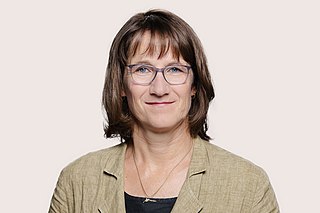The German Federal Coast Guard is a civilian law enforcement organisation whose primary missions are border protection, maritime environmental protection, shipping safety, fishery protection and customs enforcement. The Küstenwache is an association of several federal agencies, not a single entity like the United States Coast Guard.
The United States National Agricultural Library (NAL) is one of the world's largest agricultural research libraries, and serves as a national library of the United States and as the library of the United States Department of Agriculture. Located in Beltsville, Maryland, it is one of five national libraries of the United States. It is also the coordinator for the Agriculture Network Information Center (AgNIC), a national network of state land-grant institutions and coordinator for the U.S. Department of Agriculture (USDA) field libraries.

The Federal Ministry of the Interior and Community (German: Bundesministerium des Innern und für Heimat, German pronunciation:[ˈbʊndəsminɪsˌteːʁiʊmdɛsˈɪnəʁnʊntfyːɐ̯ˈhaɪ̯maːt], abbreviated BMI, is a cabinet-level ministry of the Federal Republic of Germany. Its main office is in Berlin, with a secondary seat in Bonn. The current minister is Nancy Faeser. It is comparable to the British Home Office or a combination of the US Department of Homeland Security and the US Department of Justice, because both manage several law enforcement agencies. The BMI is tasked with the internal security of Germany. To fulfill this responsibility it maintains, among other agencies, the two biggest federal law enforcement agencies in Germany, the Federal Police and the Federal Criminal Police Office. It is also responsible for the federal domestic intelligence agency, the Federal Office for the Protection of the Constitution.

The Federal Ministry of Food and Agriculture, abbreviated BMEL, is a cabinet-level ministry of the Federal Republic of Germany. Its primary headquarters are located in Bonn with a secondary office in Berlin. From 1949 to 2001 it was known as the Ministry for Food, Agriculture and Forests. Through an organizational order by the German Chancellor on 22 January 2001, it became the Federal Ministry for Consumer Protection, Food and Agriculture after the Consumer protection function was transferred from the Federal Ministry for Health. The name Federal Ministry for Food, Agriculture and Consumer Protection was adopted on 22 November 2005 simply to alphabetize its functional parts in the German language. Due to the political restructurings of the 18th German Bundestag in December 2013 the division "Consumer Protection" was transferred to the Federal Ministry of Justice and Consumer Protection.

Food safety is used as a scientific method/discipline describing handling, preparation, and storage of food in ways that prevent foodborne illness. The occurrence of two or more cases of a similar illness resulting from the ingestion of a common food is known as a food-borne disease outbreak. This includes a number of routines that should be followed to avoid potential health hazards. In this way, food safety often overlaps with food defense to prevent harm to consumers. The tracks within this line of thought are safety between industry and the market and then between the market and the consumer. In considering industry-to-market practices, food safety considerations include the origins of food including the practices relating to food labeling, food hygiene, food additives and pesticide residues, as well as policies on biotechnology and food and guidelines for the management of governmental import and export inspection and certification systems for foods. In considering market-to-consumer practices, the usual thought is that food ought to be safe in the market and the concern is safe delivery and preparation of the food for the consumer. Food safety, nutrition and food security are closely related. Unhealthy food creates a cycle of disease and malnutrition that affects infants and adults as well.
Prisons in Germany are a set of penal institutions in the Federal Republic of Germany. Their purpose is rehabilitation--to enable prisoners to lead a life of "social responsibility without committing criminal offenses" upon release--and public safety. Prisons are administered by each federal state , but governed by an overarching federal law. There are 183 prisons in all, with the most located in Germany's most populous states Bavaria and North Rhine-Westphalia. In 2022, the total number of prisoners in Germany was 56,325, an incarceration rate of 67 per 100,000 people.

The Federal Ministry for the Environment, Nature Conservation, Nuclear Safety and Consumer Protection, abbreviated BMUV, is a cabinet-level ministry of the Federal Republic of Germany. It has branches in Bonn and Berlin.

The federal administration of Switzerland is the ensemble of agencies that constitute, together with the Swiss Federal Council, the executive branch of the Swiss federal authorities. The administration is charged with executing federal law and preparing draft laws and policy for the Federal Council and the Federal Assembly.
An agricultural attaché is a diplomat who collects, analyzes, and acts on information on agriculture, agribusiness, food, and other related spheres in a foreign country or countries. Agricultural attachés may be directly employed by the sending country's agriculture ministry, or they may be employed by the foreign ministry. Typical activities of an agricultural attaché include reporting on crop conditions, food availability, domestic agricultural policy and the foreign trade outlook in agricultural commodities; negotiating food aid agreements and agricultural credit lines; implementing agricultural technical assistance programs; facilitating professional contacts, exchanges, and technology transfer; assisting in negotiating bilateral and multilateral trade agreements; and promoting the exports of agricultural and food products. In many cases, agricultural attachés may also bear responsibility for issues related to the environment, food security, food safety, fisheries, forestry, and indeed anything related to rural areas and the rural economy.
The 2008 German beekill incident occurred in July 2008, when German authorities reported that more than 11,000 beehives were affected and millions of bees were killed in an agricultural chemical poisoning incident from late April to early May that year. Affected beekeepers reported that 50 to 100 percent of their hives had been lost after pneumatic equipment used to plant corn seed blew clouds of pesticide dust into the air, which was then pushed by the wind onto neighboring canola fields in which managed bees were performing pollinator services.
The Rapid Exchange of Information System (RAPEX) is the European Union rapid alert system for unsafe consumer products and consumer protection. RAPEX does not encompass food and pharmaceutical products and drugs. It does cover products such as clothing, shoes, cosmetics, jewelry or toys with potentially harmful ingredients or quality or even products with technical faults, electrical appliances that present an electric shock or ignition hazard.

The German Federal Institute for Risk Assessment, abbreviated BfR, is a body under public law of the German federal government with full legal capacity. The institute comes under the portfolio of the Federal Ministry of Food and Agriculture and has the task of providing scientific advice to the federal government on issues relating to food safety, product safety, chemical safety, contaminants in the food chain, animal protection and consumer health protection. Further technical supervision is performed by the Federal Ministry for the Environment, Nature Conservation, Building and Nuclear Safety and the Federal Ministry of Transport.

Norbert Lins is a German politician who has served as a Member of the European Parliament (MEP) since 2014. Since 2019, he has chaired the Committee on Agriculture and Rural Development. He is a member of the Christian Democratic Union (CDU), part of the European People's Party (EPP).

Food safety in the United States relates to the processing, packaging, and storage of food in a way that prevents food-borne illness within the United States. The beginning of regulation on food safety in the United States started in the early 1900s, when several outbreaks sparked the need for litigation managing food in the food industry. Over the next few decades, the United States created several government agencies in an effort to better understand contaminants in food and to regulate these impurities. Many laws regarding food safety in the United States have been created and amended since the beginning of the 1900s. Food makers and their products are inspected and regulated by the Food and Drug Administration and the Department of Agriculture.

Ulrich Wolfgang Kelber is a German former politician of the Social Democratic Party (SPD) who has been serving as the Federal Commissioner for Data Protection and Freedom of Information since 7 January 2019. From 2000 to 2019, he was the member of the Bundestag for Bonn.

Uwe Feiler is a German politician of the Christian Democratic Union (CDU) who has been serving as a member of the Bundestag from the state of Brandenburg since 2013. From 2019 to 2021 he was a Parliamentary State Secretary at the Federal Ministry of Food and Agriculture in the government of Chancellor Angela Merkel.

The Deutscher Bauernverband) is the largest agricultural and forestry professional association in the Federal Republic of Germany. The DBV is the most significant interest group, lobbying and professional association of farmers in Germany.

Franziska Kersten is a German veterinarian and politician of the Social Democratic Party (SPD) who has been serving as a member of the Bundestag since 2021, representing the Börde – Jerichower Land district.












